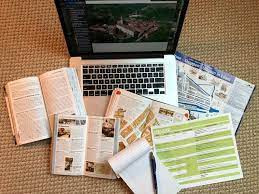
Dear Ms. Smartphone: I am an older traveler and have caught the travel bug again now that I am fully vaccinated. I plan to take some seriously long car trips and perhaps a cruise. I am thinking that trip planning is online and the most complete travel information is on my Ipad or Iphone. My girlfriend insists trip planning is not online and recommends that I start with the bookstore for travel books and the auto club for maps. Hasn’t most trip planning moved online, and am I not right to start there? Cecil, Oakland
Dear Cecil: You are both right. It comes down to a matter of personal preference as well as familiarity and trust with online platforms. Rather than choose one or the other, why not use both online sources and the travel books and maps as complements for trip taking? After all, you have more than one adventure in mind!
Online maps will help you get from point A to B, but in other ways might narrow your adventures. They typically program you to take the most efficient route, although scenic routes can be found in the ‘alt’ settings. An online map makes you seek a destination so you might miss a detour that captures spur-of-the-moment interest. Entering “What’s Near Me” on Google maps helps but remember that what loads first is often a paid-for-ad. I personally begin every long trip with a big-old fold out road map. The bigger screen for a map display, say on the IPad, is spotty without cellular service.
Place or Placement?
Once you are on the road, you could use sites like Yelp/Open Table, and Hotels/ Trip Advisor (no endorsements here) to identify where to eat and stay. Again, the recommendations that rise to the top are ad placements. But, that’s not to say that print travel guides don’t have drawbacks. Print books have been called out for inaccuracies, and it’s hard to keep the recommendations for food and hotels up-to-date. Recently these books have been diminished by the force of the Internet.
Keep in mind that travel is a huge ($$) industry, and there are lots of sources that would like to literally track your entire trip. I looked up an online source that Lonely Planet, once a trusted source, recommended called Thorn Tree. It had a site forward that then asked me to log in with a Twitter account or Facebook. While I could begin there for travel ideas, should I? The option was to create an online account and doing so was like giving a pint of blood: this online travel site demanded my email address, and then, surprise, my age, zip code, and more.
Is it Travel-Bait?
If I had exchanged privacy for travel information perhaps the site would have recommended the ‘top ten things.’ That’s just more click-bait travel following the bucket-list tradition. With that in mind I hope the travel advice you seek will be more expansive.
Before you set out, you may want to purchase or download printed travel guides or check them out from the library. Get the latest versions of these books if you plan to use their hotel/dining recommendations! The guide books should help you go deeper than the ‘top ten’ to discover the cultural background and history of places you visit. How did this community get settled and what do people do there? If you were a local, what would be unusual and interesting in this place? There was an in-print travel guide called NFT (Not For Tourists) that used to cover some of the bases for bigger cities. If guidebooks doesn’t work for you, and you are somewhat extroverted, then seek a local watering hole when you arrive and ask the bartender, barista, or patrons for ideas.
When we take a trip to someone else’s community we are dropping in: it’s important to honor their local values and traditions. Some of that tradition might be found in places or occasions: say the baseball stadium, the annual county fair, the pancake breakfast fundraiser, and the bimonthly antique show. If you exclusively search online, you might drive right past it.

Leave a Reply
You must be logged in to post a comment.